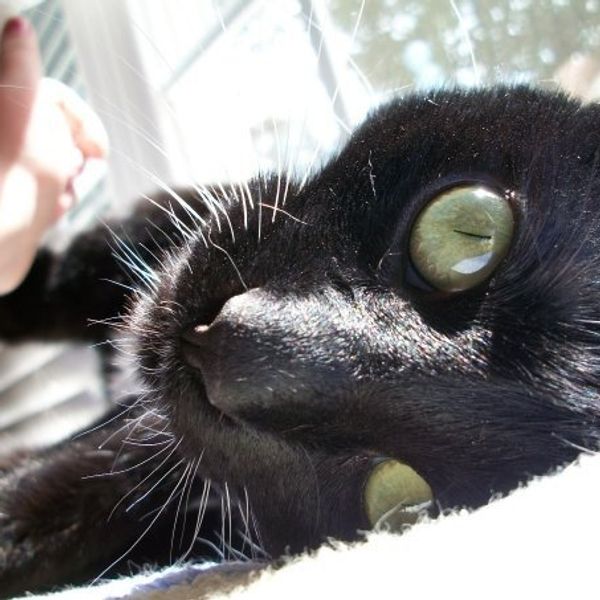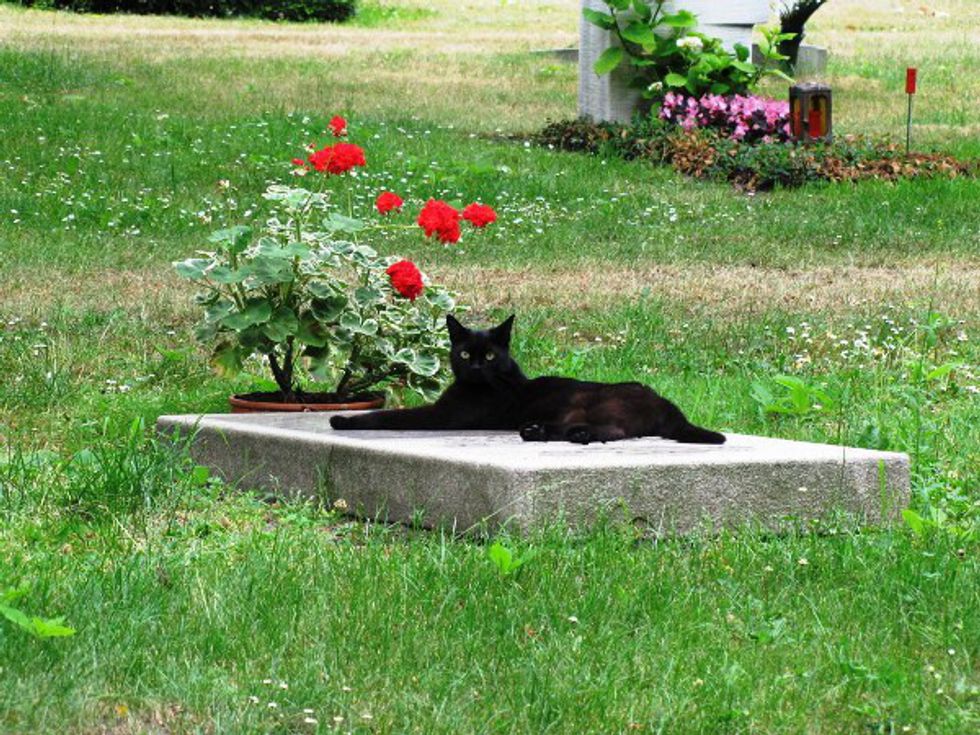It seems that there's a constant war between cat lovers and dog lovers, with each insisting that their favorite is man's real best friend. Cats have gotten the worst end of the stick in many ways; they're labelled as stuck up, antisocial, disloyal, and even mean while dogs are praised as joyful, kind little goofballs who want nothing more than to love everyone. While it's true that dogs are great, cats are wonderful too, and most of the negative characteristics that popular culture forces upon them aren't true. Just think of dogs as extroverts and cats as introverts--they may need more recharging space, but cats are still loving, playful little goofballs.
1. All cats are antisocial.
Every cat, just like people and dogs, has a unique personality, not to mention unique experiences that guide their actions. Yes, some cats are overwhelmed and even scared by a lot of guests, but that doesn't mean they're antisocial. Those particular cats generally need more time to get comfortable with and bond with people--and maybe they'll only bond with their family. Other cats are incredibly outgoing and love all kinds of people. My cat, Ethan, was anything but antisocial--he loved nothing more than to greet new people, weasel a few scratches out of them, and smell their feet.
2. Cats don't love you.
I can't tell you how often I've heard someone say that "cats just don't love you like dogs do." As a bona fide cat owner, I can tell you that they do love people just as much as dogs do--they simply express it in a different way. While dogs famously express their love in sloppy kisses, violent tail-wags, and hours upon hours of playtime, cats do things differently. They prefer to show their love by bumping their head against yours, rubbing against your legs, and sleeping on your pillow (or you) at night. This, of course, varies based on your cat's personality--perhaps your cat doesn't enjoy sitting on your lap but absolutely adores rubbing against your legs while you cook. It's a expression of love (or an attempt to kill you by tripping you, but they're adorable, so what does it matter?).
3. Cats don't care when you're sick.
I've heard so many stories about dogs licking and cuddling their owners when they're sick, or being particularly gentle with disabled kids. Similarly, a lot of people use the supposed fact that cats don't care when their owners are sick as ammunition in the dogs-versus-cats debate. The truth is that cats definitely care when you're sick; Ethan was never a lap cat (although he did sleep on my pillow every night), but whenever I got sick, he'd jump on the couch with me and lay on my back or stomach while I napped, purring the whole time. I've heard similar stories from other cat owners.
4. Cats don't comfort you when you're upset.
This claim goes right along with the claim that cats don't care when you're sick, and just like that one, it's completely false. Just like dogs, cats know and care when you're upset, it's just that their way of comforting us is gentle. Head butts, loud purring, and rubbing against us are all things that a cat does to cheer us up--not to get attention regardless of our obvious distress.
5. Cats don't miss you when you're gone.
This is another myth that drives cat lovers insane, and one that an article I read recently challenged me to disprove. Specifically, it challenged me to find an example of a cat that actually cared when a soldier came home, so I took them up on that (thus the video above). Yes, dogs are much more vocal about their distress when they're left alone or their favorite person leaves the house--they cry, sit by the door, and maybe even bark until the person comes back. Cats are independent and great at being left alone, but it does often get to them when they're left alone for a long period of time. I've done quite a bit of cat sitting and know from experience that cats tend to eat less when their owners aren't around. When you come home from vacation, your cat will most likely be waiting quietly at the door, playing it cool as if he or she knew you were coming and it's really no big deal. In reality, they're really happy you're home--otherwise they wouldn't be at the door. Vocal cats will probably even greet you with a few meows (or a lot of them, like the cat in the video, which even jumps into the soldier's arms).
6. Cats aren't loyal.
A lot of dog lovers seem convinced that cats are incapable of the loyalty and love that it takes to fuel the stories you hear about dogs returning to their dead owners' graves. Once again, it's simply not true--a quick Google search renders plenty of examples of cats who have done the exact same thing. This cat, for example, visits his dead owner's grave every day and leaves presents of twigs and leaves. So there, dog people.
7. Cats are stuck up.
Being "quiet" and "independent" doesn't mean that they're stuck up. You wouldn't call an introvert, a personality type famous for its need of quiet space and alone time in order to recharge, "stuck up." Cats are a lot like introverts. Even the most confident and vocal of cats will probably disappear for a few hours for a bit of alone time, and that's okay. It doesn't mean that they love us any less than dogs--they're just an entirely different species and we can't expect them to act or express their love in the same ways.
8. Cats can't be silly.
Who says cats can't be silly? Dog people, apparently. I would like to contest that, using the evidence of cats and their absolute, unconditional love for bags and boxes of any kind and size--not to mention their tendency to get stuck in said bags and boxes. Christmas is a cat's winter wonderland of bags, boxes, and the oh-so-rare tissue paper that they love so much. It's hilarious--just unwrap the presents, sit back, and watch your cat go crazy!
9. Cats hate to cuddle.
It's true that some cats aren't cuddlers, but that doesn't mean that all cats hate to cuddle. The term "lap cat" exists among cat lovers, and it means very much the same thing as "lap dog" does--any time a person is sitting down, these cats feel the need to be curled up on their laps, purring like a motorboat.
10. Cats don't come when you call them.
Every single cat I've ever known has come when called. Oftentimes, even if you don't know a cat's name, all you have to do is click your tongue at it and stick your hand out and it'll come right over for a pet and a scratch (as long as it's not feral). That particular trick doesn't work with shy or skittish cats, but it does with more confident cats. It's especially effective when you know the cat; Ethan didn't saunter lazily downstairs when we called him, either--he came running down from his favorite spot at the top of the stairs, meowing excitedly the whole way, and greeted whoever called him with friendly leg rubs.
11. Cats are only playful when they're kittens.
Admittedly, cats sleep a lot. That doesn't mean, though, that they don't still love being played with. They'll play with anything--string, a pen, a piece of balled up paper rescued from the trash. Even better, they take such good care of their toys that you pretty much don't ever have to get them new ones (unless you want to spoil them). You can usually entice them to play with you (even if they're not in the mood) if you drag and flick a string just right; it's as if they feel a duty to rid the world of the string's evil.
12. Only dogs are good with babies.
Some dogs are great with little humans of all sizes, whether they're newborns or toddlers who feel the need to run around, pulling on the family dog's tail and ears and laying all over them. It's a stereotype that dogs are great with this kind of behavior while cats...aren't. The truth is, though, that some dogs are horrible with babies--I've had one dog who absolutely loves them and one who was more liable to try and rip their faces off. Likewise, some cats are horrible with babies, and others are just as great with them as dogs stereotypically are. They'll cuddle with them, let them lay on them and pull their ears and tails, and will allow toddlers to pick them up--incorrectly--and drag them all over the house. It all depends on personality for both dogs and cats.
13. Cats poop around the house when they're angry.
This one's just kind of ridiculous. Animals don't say, "Wow, you left me, I'm bitter so I'm going to poop in your house since you don't like that." Cats particularly are very clean animals, and litter boxes work so well for them for that very reason--it's very instinctual for them to bury their business. If they don't go in the litter box, there's something wrong; the litter is either too filthy for them to want to go in it, the litter is too harsh on their paws (this is a big problem for declawed cats, as their paws are more sensitive), or they're stressed out for some reason. They're too clean to go against their instincts and poop or pee on the floor just to spite us.

































